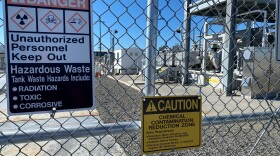Three tanker cars derailed at a Seattle rail yard early Thursday while carrying oil from North Dakota to a refinery in Anacortes.
No one was hurt and none of the oil spilled, according to Burlington Northern Santa Fe. But the incident spurred renewed calls from the city for a ban on oil train traffic near neighborhoods.
Just a day before the accident, all nine members of the Seattle City Council signed a letter to the U.S. Department of Transportation, calling for an immediate end to the shipment of Bakken crude oil in older rail cars, known as DOT 111s.

The legacy cars are the kind that exploded after the fiery derailment in Quebec a year ago that killed 47 people. And while nothing nearly as tragic happened in Seattle’s Interbay neighborhood Thursday, city council member Mike O’Brien said the potential is terrifying.
“It doesn’t take much imagination to think if something were to happen,” O’Brien said after touring the site. “It was right underneath the Magnolia Bridge. You know, thousands of commuters every morning going over that. We’re just one little accident away from all sorts of things that could really either disrupt life in Seattle or have tragic human life consequences.”
O’Brien said the railroad companies are making additional profits on oil transport and should be required to invest in safety precautions to avert more disasters.
BNSF said the three train cars that derailed in Seattle were all the more modern kind that are retrofitted with enhanced safety features to help prevent explosions. And they were only traveling about 5 mph when they tipped.
The railroad reports moving as many as 13 oil trains containing a million gallons or more of Bakken crude through Seattle each week. The tracks run beneath downtown and flank the big stadiums to the south. Areas up to a half mile or more from an accident site are considered vulnerable.
Over the past six years, there have been 10 significant derailments in the U.S. and Canada in which crude spilled from ruptured tanker cars.








